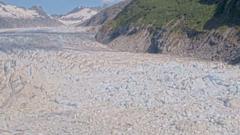Amid impending geopolitical discussions involving President Trump and President Putin, residents of Anchorage convey a spectrum of opinions—from protest to support—reflecting the complex historical ties and current tensions with Russia.
Alaskans Reflect on the Polarizing Summit Between Putin and Trump

Alaskans Reflect on the Polarizing Summit Between Putin and Trump
Citizens of Anchorage express mixed emotions as the spotlight turns on their city with the upcoming meeting of Russian and American leaders.
As world leaders prepare for a contentious summit in Anchorage, Alaska, responses from its residents exhibit a range of emotions, revealing deep-seated sentiments tied to their unique geographical and historical position.
Among those making their voices heard is Hanna Correa, a Ukrainian expatriate residing in Anchorage. "Putin is supposed to be in jail, and he just comes to Alaska like that," she expressed through tears, as she and fellow protesters held Ukrainian flags along the road leading to Joint Base Elmendorf-Richardson. The noteworthy absence of Ukraine’s President, Volodymyr Zelensky, from the talks only deepened her feelings of disappointment.
Christopher Kelliher, a local military veteran, shared his frustration, critiquing the summit and calling the presence of Putin in the state “gross.” He lamented, “We have an idiot in the White House that will kowtow to this guy,” voicing the sentiments of many who oppose an apparent soft stance toward the Russian leader.
Historically, the relationship between Alaska and Russia is a complex one, dating back to the U.S. purchase of the territory in 1867. This backdrop adds a poignant layer to the current meeting. At the same time, the St Tikhon Orthodox Church in Anchorage has been engaged in prayerful contemplation ahead of the summit. “We’re hoping that this meeting will lead to something positive,” remarked Father Nicholas Cragle.
Meanwhile, Alaskans like Don Cressley, who are enjoying a fishing trip, express a belief in the potential of the summit to spur negotiations for peace. Cressley, utilizing his time amid nature, wishes Zelensky were involved in discussions but maintains faith in Trump's negotiation approaches.
The palpable sense of unease remains among many residents concerning Russian military activity, especially given their proximity to the neighboring superpower. Local fisherman Russell Wilson articulated this concern, linking Alaska’s strategic importance to national security. “If the president doesn't put the hammer down, we could be the next Ukraine,” he warned.
Yet, others remain skeptical of impending threats, as Kelliher noted with a smile, “Not really, everybody in Alaska owns a gun,” suggesting a certain confidence in local self-defense.
As Alaskans witness the intricate dance of international diplomacy unfold in their home city, their voices reflect the profound complexities inherent in a modern geopolitical climate where every conversation bears weighty implications.





















